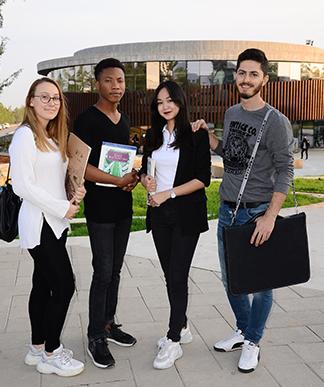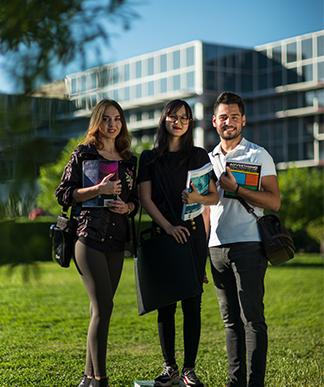


About the Program
Tourism Management Ph.D. aims to provide advanced education, designed to mold visionary scholars who will shape the future of global tourism. Furthermore, it offers a dynamic and interdisciplinary approach that combines academic rigor with practical insights, preparing graduates to lead in an era of sustainable tourism. Moreover, it aims to raise scholars who are not only experts in their chosen areas but also pioneers capable of driving positive change within the tourism landscape. In a world where tourism is a powerful catalyst for economic development, cultural exchange, and environmental impact, this Ph.D. program provides a chance for those who wish to influence policy, contribute groundbreaking insights, and lead initiatives that foster sustainable tourism practices, making a lasting impact on the global stage. This program opens doors to top-tier academic positions, research institutions, governmental bodies, and international organizations, enabling graduates to pursue impactful careers in their chosen fields.
Education Opportunities
Students undertake a total of seven Ph.D. courses in order to graduate from the Tourism Management Doctorate program. When students enroll, they may register for up to four courses per semester in the thesis program. Two of the seven courses in the program are compulsory, while the rest of the courses are elective. Students register for the program with the assistance of their course advisors who also guide students throughout the program. The library and the Institute of Graduate Studies and Research provide online and offline access to databases for students. Program advisors appoint a thesis supervisor when students enroll in the thesis/project. Students utilize a variety of databases to complete their thesis or project. They are encouraged to produce high-quality work to contribute to the literature on tourism and hospitality. Graduates are expected to produce at least one publication indexed in SSCI. Cyprus International University, School of Tourism and Hotel Management is accredited by the German accreditation body of FIBAA.

Career Areas
Graduates with a Ph.D. in Tourism Management are equipped to excel in a variety of dynamic and influential career fields. They can take academic leadership roles in universities, contributing to the education and development of future professionals in the field. The graduates can also get a chance to engage in advanced research, contributing to the academic knowledge base and shaping tourism-related policies at local, national, or international levels. On the other hand, they may offer specialized consultancy services to tourism businesses, government bodies, and international organizations. This Ph.D. may also pave the way for graduates to assume leadership roles in top-tier hotels, resorts, and hospitality enterprises. Upon having completed this program, the graduates may start and manage tourism-related businesses as well as leading initiatives promoting responsible and sustainable tourism practices. Additionally, the graduates may lead and advise on destination management strategies, helping regions and cities optimize their tourism potential.
Contact
Institute of Graduate Studies and Research
Graduate Sciences and Education Center, GE106
Tel: +90 392 671 1111 Extension: 2776
Institute E-mail: ciu-institute@ciu.edu.tr
Compulsory Courses
First Semester
ADVANCED RESEARCH METHODS
Course code
TMAN601Credit
3Theoretical
3Practical
0Ects
ORGANIZATIONAL THEORY
Course code
TMAN603Credit
3Theoretical
3Practical
0Ects
5AREA ELECTIVE
Course code
TMANXX1Credit
3Theoretical
3Practical
0Ects
Second Semester
Philosophy of Science
Course code
PHIL601Credit
3Theoretical
3Practical
0Ects
8DESTINATION DEVELOPMENT AND MANAGEMENT
Course code
TMAN602Credit
3Theoretical
3Practical
0Ects
AREA ELECTIVE
Course code
TMANXX2Credit
3Theoretical
3Practical
0Ects
AREA ELECTIVE
Course code
TMANXX3Credit
3Theoretical
3Practical
0Ects
Third Semester
SEMINAR
Course code
TMAN690Credit
0Theoretical
0Practical
0Ects
5Fourth Semester
QUALIFYING EXAM
Course code
TMAN650Credit
0Theoretical
0Practical
0Ects
0Fifth Semester
DISSERTATION
Course code
TMAN600Credit
0Theoretical
0Practical
0Ects
Elective Courses
Students who are interested in pursuing advanced graduate studies leading to a master’s, doctoral degree or professional doctorate degree for the Fall and Spring semesters every year. Applicants can directly apply online to our graduate programs using the application portal.
TRNC Applicants- Required documents:
- Bachelor’s and Master’s Degree Diploma
- Bachelor’s and Master’s Degree transcripts for each completed academic term/year.
- Documents to prove English proficiency for English language departments,
- Scanned copy of passport or identity card.
Click for detailed admission requirements information.
Students who are interested in pursuing advanced graduate studies leading to a master’s, doctoral degree, or professional doctorate degree for the Fall and Spring semesters every year. Applicants can directly apply online to our graduate programs using the application portal.
International Applicants- Required documents:
- A valid Bachelor’s Degree and transcripts for each completed academic term/year.
- A valid Master’s Degree and transcripts for each completed academic term/year.
- Evidence of English Language competence: TOEFL (65 IBT) or IELTS (5.5). Students without these documents will take the CIU English proficiency exam on campus following arrival.
- Scanned copy of international passport/birth certificate
- CV
- Ph.D. research proposal
- Fully completed and signed CIU Rules and Regulations document (which can be downloaded during the online application)
Click for detailed admission requirements information.
Cyprus International University provides academic scholarships for its students as an incentive for success, with most students benefiting from 50%, 75% or 100% scholarships or discounted tuition fees. Click for more information.
Click for more to learn about fees in line with the Tuition Fee Calculation system.
| Fee per course | € 650,00 |
| Fee for thesis (4 Semesters) | € 2.600,00 |
| Fee for seminar | € 200,00 |
| Scientific Foundation per course | € 150,00 |
| Annual Registration Fee | € 295,00 |
| VAT Exc. |